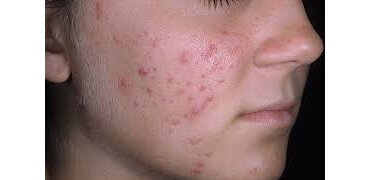Acne is a skin condition caused by the pores of the skin becoming clogged up with oil, old cells and bacteria.
Who gets Acne?
Anyone of any age can develop acne, but it appears more troublesome in teenagers, mainly because it can be triggered by hormonal changes. It is also worsened by some medicines and cosmetics. There is no evidence that acne is affected by fatty foods, such as chocolate, although diets high in sugar may worsen acne.
Clinical Features
Acne commonly occurs on the face, shoulders, back or chest. It may start as a few raised white bumps and develop into small pustules. In severe cases, firm, painful lumps called cysts can develop under the skin. Acne is classified as mild, moderate to severe.
Treatment
All acne is helped by regular cleansing of the skin and hair with gentle non drying cleansers that are readily available from any community pharmacy. Avoid squeezing and picking at the spots as this can cause scarring.
Mild acne with blackheads and occasional small pimples will be improved by gentle cleansing.
Treatment: Topical anti-acne preparations, laser and light.
Moderate acne may require over-the-counter preparations that dry up skin oils.
Treatment: Antibiotics such as tetracyclines &/or antiandrogens such as birth control pill.
Severe acne with reddened areas around the pimples, deep painful cysts or significant scarring may benefit from prescription medicines to treat these over a long period of time.
Treatment: May require a course of oral isotretinoin talk to your GP.
Acne is a condition that may affect you for many years and, unfortunately, there is no wonder cure. However, the damage to your skin and self esteem can be minimised by following the treatment and advice of your local community pharmacist or your GP.






